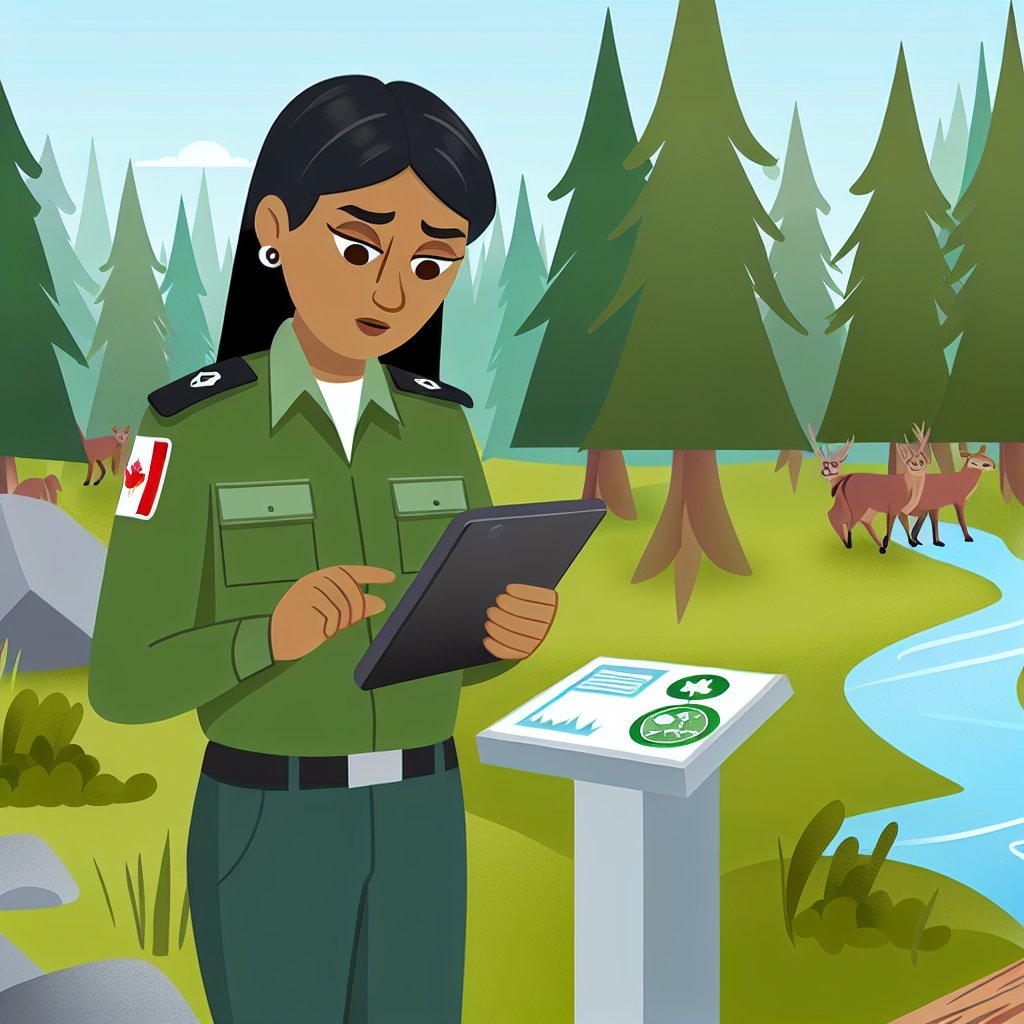Overview of Environmental Officer Role in Canada
Environmental officers play a crucial role in safeguarding Canadian ecosystems.
They monitor environmental regulations and ensure compliance in various industries.
Furthermore, these professionals assess environmental impacts from proposed projects.
They perform fieldwork, collecting samples and conducting site inspections.
Data analysis is essential for identifying pollution sources and trends.
Environmental officers also enforce environmental laws and regulations.
They collaborate with government agencies and local communities on conservation efforts.
Additionally, they educate the public about environmental issues and policies.
Their work helps maintain natural resources for future generations.
This role requires a strong background in environmental science or related fields.
Key Responsibilities
Environmental officers undertake several critical responsibilities.
They conduct environmental assessments to evaluate potential impacts.
Additionally, they develop plans to mitigate negative environmental effects.
Communication skills are vital for reporting findings and collaborating with others.
They must stay informed about current regulations and technological advancements.
Moreover, they review and analyze environmental impact reports submitted by companies.
Skills and Qualifications
A degree in environmental science is typically required for this position.
Strong analytical skills are essential for interpreting complex data.
Problem-solving abilities help in formulating effective solutions.
Excellent communication skills enhance collaboration with various stakeholders.
Additionally, familiarity with environmental legislation is crucial for compliance.
Career Opportunities
The demand for environmental officers is growing across Canada.
Various provinces are particularly high in demand for these professionals.
Opportunities exist in government, private industry, and non-profit organizations.
Environmental officers can advance to managerial or specialized roles over time.
Unlock Your Career Potential
Visualize a clear path to success with our tailored Career Consulting service. Personalized insights in just 1-3 days.
Get StartedThey can also pursue certifications for further career development.
Key Provinces with High Demand
Overview of Demand
Environmental officers play a crucial role in sustainable development across Canada.
Increasing awareness of environmental issues drives this demand forward.
The job market for these professionals varies significantly by province.
British Columbia
British Columbia is a leader in environmental initiatives.
Many organizations seek qualified environmental officers in this province.
Government policies promote sustainability and conservation efforts.
Numerous job opportunities exist in both the public and private sectors.
Ontario
Ontario has a large number of urban centers focused on sustainability.
With numerous industries, there is a high need for environmental regulation compliance.
Environmental officers help in managing pollution and waste management.
The province invests heavily in green technology and sustainability practices.
Alberta
Alberta has seen a growing interest in environmental stewardship.
As industries expand, so do the responsibilities of environmental officers.
Renewable energy projects have spurred job opportunities in this region.
The Alberta government emphasizes environmental assessments and monitoring.
Quebec
Quebec is committed to environmental sustainability in various sectors.
Numerous organizations focus on climate change and conservation initiatives.
Employment prospects for environmental officers in Quebec are robust.
Collaboration between government and industry enhances job availability.
Nova Scotia
Nova Scotia also shows an increasing demand for environmental professionals.
Marine and coastal management creates specific job opportunities.
Positive government policies encourage sustainable practices throughout the province.
Furthermore, community engagement drives local environmental projects.
British Columbia: The Leader in Environmental Sustainability
Overview of Environmental Initiatives
British Columbia sets a high standard for environmental sustainability.
The province implements innovative environmental policies.
Local governments prioritize eco-friendly practices.
Businesses adapt to meet sustainability regulations.
Ultimately, these efforts create a greener landscape.
Growth of Environmental Officer Roles
As initiatives expand, so does the need for skilled professionals.
Environmental officers play a crucial role in this growth.
They monitor compliance with environmental laws.
These officers also educate the community about sustainability.
Consequently, job opportunities in this field are increasing.
Key Areas of Employment
Various sectors represent high demand for environmental officers.
- Government agencies require officers to enforce regulations.
- Non-profit organizations focus on conservation efforts.
- Private companies seek experts to develop green strategies.
Additionally, educational institutions are hiring professionals.
These roles promote research and environmental education.
Environmental Certifications and Qualifications
Many employers prefer candidates with relevant certifications.
These credentials enhance knowledge and skill sets.
Common certifications include those from environmental associations.
- Certified Environmental Professional (CEP)
- Environmental Impact Assessment certification
- ISO 14001 Internal Auditor training
Such qualifications ensure professionals are well-prepared.
Future Outlook for Environmental Officers
The demand for environmental officers will likely grow.
Public awareness of environmental issues drives this demand.
Furthermore, British Columbia aims for net-zero emissions by 2050.
Consequently, more roles will emerge in response to legislation.
Environmental officers are essential for realizing these goals.
Explore Further: Roles and Responsibilities of an Environmental Officer
Alberta: Opportunities in Oil and Gas Sector Compliance
Overview of Alberta’s Economic Landscape
Alberta thrives in the oil and gas industry.
This sector significantly contributes to the province’s economy.
Many companies seek skilled environmental officers for regulatory compliance.
In particular, roles focus on environmental assessments and reporting.
Key Areas of Demand
Several key areas drive the demand for environmental officers in Alberta.
- Exploration and production activities require compliance oversight.
- Refining and processing plants need regular environmental evaluations.
- Site reclamation projects create positions for remediation specialists.
Skills and Qualifications
Employers seek specific skills in environmental officers.
A background in environmental science holds great value.
Knowledge of Alberta’s regulatory frameworks is essential.
Moreover, effective communication skills help in stakeholder engagement.
Major Employers
Numerous companies operate within Alberta’s oil and gas sector.
Enbridge is a key player in pipeline and infrastructure management.
Suncor Energy is another significant employer with diverse operations.
Additionally, smaller firms frequently seek environmental compliance personnel.
Networking and Professional Development
Networking plays a crucial role in finding opportunities.
Industry events and conferences enable professionals to connect with peers.
Professional organizations like the Canadian Environmental Network offer valuable resources.
Furthermore, continued education enhances career prospects in this field.
You Might Also Like: Differences Between Federal and Provincial Correctional Roles
Ontario: Urban Development and Environmental Management Needs
Rapid Urbanization
Ontario experiences significant urban growth each year.
This expansion introduces numerous environmental challenges.
Urban areas face issues such as pollution, waste management, and habitat destruction.
Consequently, the demand for environmental officers is rising.
Role of Environmental Officers
Environmental officers play a critical role in managing these challenges.
Their responsibilities include enforcing regulations and promoting sustainable practices.
They also collaborate with developers to ensure compliance with environmental standards.
Additionally, they educate the public on environmental conservation.
Key Areas of Focus
- Air Quality Management
- Water Resource Protection
- Wildlife Conservation Initiatives
- Waste Reduction Strategies
Each area requires targeted strategies to address specific issues.
For instance, improving air quality involves monitoring pollutants and land use planning.
Water resource protection emphasizes sustainable fishing and watershed management.
Collaboration with Local Governments
Environmental officers often partner with local governments.
This collaboration ensures that urban planning aligns with environmental sustainability.
They provide expertise and guidance during project development phases.
Thus, they help to balance economic growth and ecological health.
Career Opportunities
With growing needs, career opportunities for environmental officers flourish.
Many organizations seek qualified individuals to fill these roles.
Prospective employees can pursue roles in both public and private sectors.
Fieldwork, policy development, and education are common career paths.
You Might Also Like: Common Misconceptions About Correctional Officers
Quebec: Biodiversity and Conservation Efforts
Rich Biodiversity
Quebec is home to a wide range of ecosystems.
This province boasts lush forests, vast wetlands, and beautiful coastlines.
In fact, nearly 50% of Quebec’s land is covered by forests.
These natural habitats support diverse flora and fauna.
Consequently, biodiversity plays a crucial role in ecological balance.
Conservation Initiatives
The government of Quebec prioritizes conservation efforts.
Many organizations focus on protecting critical habitats.
For example, the Société de la faune et des parcs du Québec engages in various projects.
These projects aim to restore ecosystems and protect endangered species.
Additionally, initiatives promote sustainable development practices.
Public Participation
Community involvement is vital in conservation efforts.
Local residents actively participate in reforestation programs.
Educational workshops raise awareness about environmental issues.
Moreover, volunteers often help with monitoring wildlife populations.
Such initiatives foster a sense of responsibility toward nature.
Legislation and Policies
Quebec has enacted several laws to protect biodiversity.
The Act Respecting the Conservation of Biodiversity is a key regulation.
This legislation outlines measures to conserve ecosystems across the province.
Furthermore, specific policies address invasive species management.
These efforts ensure the sustainability of natural resources.
Future Directions
Looking ahead, Quebec aims to enhance its conservation strategies.
Research and monitoring of ecosystems will continue to expand.
Collaboration with international organizations is also planned.
Ultimately, the goal is to achieve a healthy and vibrant natural environment.
Through these efforts, Quebec leads the way in biodiversity conservation.
You Might Also Like: Work Environments for Canadian Environmental Officers

Nova Scotia: Emerging Markets for Environmental Professionals
High Demand for Environmental Expertise
Nova Scotia is experiencing increased demand for environmental officers.
Government initiatives are driving this growth.
Environmental regulations are becoming more stringent.
Companies are seeking experts to ensure compliance.
This trend offers exciting opportunities for job seekers.
Key Industries in Need
Several industries are actively hiring environmental professionals.
The renewable energy sector leads the way.
Wind and solar projects require extensive environmental assessments.
Additionally, the fisheries industry seeks sustainable practices.
Conservation and wildlife management also play a significant role.
Educational Institutions Supporting Growth
Local universities are adapting their programs to meet market needs.
Dalhousie University offers degrees in environmental science.
Saint Mary’s University provides courses focused on sustainability.
These institutions prepare graduates for the evolving job landscape.
Networking and Professional Development
Networking plays a crucial role in this competitive field.
Environmental conferences connect job seekers with industry leaders.
Organizations such as the Nova Scotia Environmental Network facilitate interactions.
Staying informed about industry trends enhances career prospects.
Future Growth Potential
The future looks promising for environmental officers in Nova Scotia.
Government investments in sustainability will drive job creation.
Moreover, public awareness of environmental issues continues to grow.
This trend will likely lead to even more job opportunities.
Factors Driving Demand
Legislative Changes
New laws aimed at environmental protection are on the rise.
These regulations create a need for more environmental officers.
Provinces are prioritizing sustainability in various sectors.
For instance, stricter emissions standards are now common.
Organizations must adapt to comply with these rules.
Consequently, the demand for skilled professionals increases.
Governments are also investing in renewable energy initiatives.
This investment requires oversight and management by experts.
Public Awareness
Public awareness of environmental issues has surged in recent years.
As a result, communities demand more action from organizations.
People are increasingly conscious of their ecological footprints.
This growing concern drives communities to seek environmental solutions.
Consequently, organizations must hire environmental officers for guidance.
In turn, these professionals help educate the public about sustainability.
They also advocate for practices that reduce environmental impacts.
This shift in public consciousness significantly influences job growth.
Future Trends: The Evolving Role of Environmental Officers in Canada
Introduction to Environmental Officers
Environmental officers play a crucial role in safeguarding the environment.
Their responsibilities are expanding as environmental issues become more complex.
This expansion includes regulatory compliance, sustainable practices, and public awareness.
Emerging Responsibilities
One significant change is the growing focus on climate change mitigation.
Officers now regularly assess the impacts of climate actions.
Additionally, they develop strategies to reduce carbon footprints across industries.
Another responsibility involves overseeing biodiversity conservation efforts.
Environmental officers promote practices that protect native species and habitats.
Technology Integration
Technological advancements are revolutionizing the work of environmental officers.
Data analytics tools help in monitoring environmental conditions effectively.
Remote sensing technology enhances their ability to oversee large areas.
Moreover, the use of artificial intelligence aids in predicting environmental changes.
Collaboration with Other Sectors
Collaboration is becoming increasingly important for environmental officers.
They work closely with government agencies, NGOs, and private companies.
These partnerships foster innovation in sustainable practices.
Furthermore, collaborative efforts enhance public awareness and education.
Future Workforce Trends
The demand for skilled environmental officers is expected to rise significantly.
Educational institutions are adapting their programs to meet this demand.
Moreover, professionals in this field will require ongoing training.
As regulations evolve, staying updated will be crucial for success.
Implications for Canada’s Environmental Future
The role of environmental officers in Canada is continuously redefined.
They are vital in addressing present and future environmental challenges.
By integrating technology and collaboration, they can make a substantial impact.
Ultimately, their efforts will shape Canada’s environmental future.
Additional Resources
The Canadian Critical Minerals Strategy – Canada.ca
Authenticate your documents – Before you start (Step 1)




